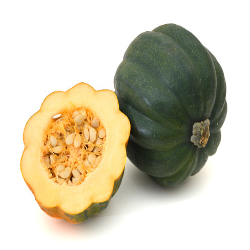Spinach Nutrition facts
Spinach

Spinach (Spinacia oleracea) is one of the incredible green-leafy vegetables often recognized as one of the functional foods for its health-benefiting antioxidants and anti-cancer compounds. Its tender, crispy, and dark-green leaves are one of the favorite ingredients of chefs all around the world.
Botanically, it belongs to the Amaranthaceae family and its scientific name: Spinacia oleracea.
Spinacia plant grows to about 1 foot in height. Although it can be grown year-round, the fresh greens are best available soon after the winter season from March through May in the Northern Hemisphere and from September until November in the South of the equator.
At least, two varieties of spinach are cultivated for their edible leaves; Savoy type with dark-green crinkle (wrinkled) leaves and flat-leaf variety with smooth surfaced leaves.
Similar Food
-
 Acorn squash 40 Cal
Acorn squash 40 Cal -
 Amaranth greens 23 Cal
Amaranth greens 23 Cal -
 Artichoke 47 Cal
Artichoke 47 Cal -
 Arugula 25 Cal
Arugula 25 Cal -
 Asparagus 20 Cal
Asparagus 20 Cal
Source of Calorie
-
Carbs3.63 g 49%
-
Protein2.86 g 39%
-
Fat0.39 g 12%
How long to burn off 23 Calories?
*Approximate base minutes for a 25-year-old, 65 kg adult at moderate intensity.
| Nutrition Principle | Nutrition Value | Percentage of RDA |
|---|---|---|
| Principle | ||
| Energy | 23 Kcal | 1% |
| Carbohydrates | 3.63 g | 3% |
| Protein | 2.86 g | 5% |
| Total Fat | 0.39 g | 1.5% |
| Cholesterol | 0 mg | 0% |
| Dietary Fiber | 2.2 g | 6% |
| Vitamins | ||
| Folates | 194 µg | 48.5% |
| Niacin | 0.724 mg | 4.5% |
| Pantothenic acid | 0.065 mg | 1% |
| Pyridoxine | 0.195 mg | 15% |
| Riboflavin | 0.189 mg | 14.5% |
| Thiamin | 0.078 mg | 6.5% |
| Vitamin A | 9377 IU | 312% |
| Vitamin C | 28.1 mg | 47% |
| Vitamin E | 2.03 mg | 13.5% |
| Vitamin K | 482.9 µg | 402% |
| Electrolytes | ||
| Sodium | 79 mg | 5% |
| Potassium | 558 mg | 12% |
| Minerals | ||
| Calcium | 99 mg | 10% |
| Copper | 0.130 mg | 14% |
| Iron | 2.71 mg | 34% |
| Magnesium | 79 mg | 20% |
| Manganese | 0.897 mg | 39% |
| Zinc | 0.53 mg | 5% |
| Phyto-nutrients | ||
| Carotene-ß | 5,626 µg | -- |
| Crypto-xanthin-ß | 0 µg | -- |
| Lutein-zeaxanthin | 12,198 µg | -- |